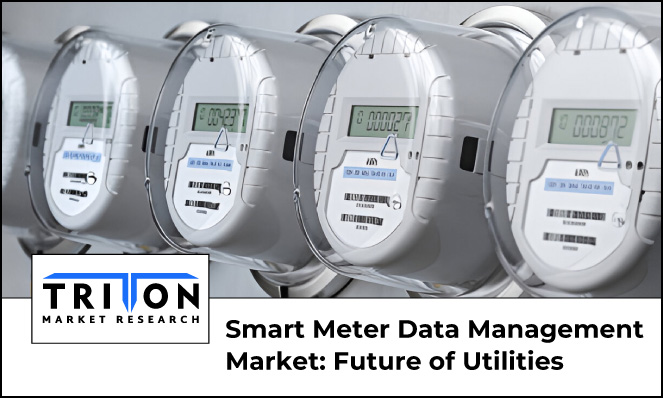



14, June 2024

According to the International Energy Agency (IEA), over the next 25 years, electricity demand is projected to outpace energy consumption, particularly in emerging markets and developing economies. By 2030, demand could surge by over 2,600 TWh, equivalent to five times Germany’s current electricity demand. This exponential growth underscores the rising demand for smart meter data management systems, essential for managing the influx of data and ensuring operational efficiency. Accordingly, Triton’s report estimates the global smart meter data management market to witness substantial growth at a CAGR of 16.91% during the forecast years 2024-2032.
Additionally, smart meter data management software plays a crucial for utilities to efficiently handle and analyze the vast amounts of data generated by smart meters. They collect, store, and process data, enabling utilities to optimize operations, improve customer service, etc. One of the key benefits of power system digitalization is improved reliability. Unreliable grids are costly, especially in developing economies where firms face capacity shortfalls and rely on backup generators. The IEA estimates that without enhanced security of electricity supply through digital technologies, these losses could reach nearly $1.3 trillion by 2030.
Explore in detail about this market in our FREE sample
Government incentives and operational efficiency drive the adoption of smart meter data management systems. Spearheading the Asia-Pacific smart meter data management market’s growth, China plans to invest $442 billion in power grid modernization by 2025. Similarly, in North America, in 2023, the US Department of Energy announced $3.46 billion for 58 projects in 44 states through the Grid Resilience and Innovation Partnerships (GRIP) Program to enhance electric grid resilience and reliability nationwide.
Operational efficiency is a significant driver as smart meter data management system reduces costs by identifying energy theft, minimizing manual meter readings, and improving demand response. In the US, advanced metering infrastructure (AMI) has cut theft-related losses. With significant government incentives and operational benefits, the global market for smart meter data management systems is poised for continued growth.
In the smart meter data management industry, deployment types play a critical role. Two major deployment types are cloud-based and on-premise solutions, each with distinct advantages.
These smart meter data management systems are gaining substantial traction due to their scalability, cost-effectiveness, and ease of integration. These systems allow utilities to leverage advanced analytics, AI, and machine learning capabilities without significant upfront infrastructure investment. For instance, Oracle’s Utilities Analytics Insights platform leverages AI to offer actionable intelligence, helping utilities manage demand and improve customer engagement.
Additionally, in February 2024, Itron Inc introduced Itron Enterprise Edition (IEE) Cloud, an enterprise-grade, cloud meter data management platform to offer flexibility for utilities, eliminating the need for continual maintenance.
Another example includes the launch of AI-based applications in May 2024 by Siemens for the effective operation of water infrastructure on the Siemens Xcelerator marketplace.
On-premise management systems offer greater control and security, making them suitable for utilities with stringent data privacy requirements. These systems require substantial capital investment and ongoing maintenance but provide customized solutions tailored to specific utility needs. While the growth rate for on-premise solutions is slower compared to cloud-based systems, they remain a vital option for utilities prioritizing data sovereignty and compliance with local regulations.
In this regard, Oracle’s MDMS maximizes utility meter data usage, from meter installation to customer engagement, as part of a comprehensive and scalable platform for water, gas, and electric utilities.
Connect with our experts for a simplified analysis!
The smart meter data management market is set for significant transformation due to emerging technologies and innovative business models. A key development is the integration of blockchain technology, which offers secure data sharing and enhanced transparency through a tamper-proof ledger, ensuring data integrity and fostering stakeholder trust. Additionally, integrating smart meter data with advanced grid management systems allows utilities to implement sophisticated demand response programs, optimize energy storage, and support the transition to decentralized energy systems. Investment opportunities abound in AI-driven analytics, IoT-enabled smart meters, and cyber security solutions tailored for smart grid applications. As utilities modernize their infrastructure, the demand for innovative smart meter data management systems will grow, presenting lucrative opportunities for investors and technology providers globally.
Grab a Quick Read to Understand the Comprehensive Outlook of the Smart Meter Data Management Market
Smart meter data management involves the collection, storage, and analysis of data generated by smart meters to optimize utility operations, improve customer service, and support energy conservation.
Q2) Can you have a smart meter without internet?While smart meters typically rely on internet connectivity for real-time data transmission, some models can store data locally and upload it when a connection is available. However, internet connectivity is essential for maximizing the benefits of smart meter data management systems.
Q3) What are the differences between digital meters and smart meters?Digital meters measure energy usage and display the reading on a digital screen, while smart meters measure energy usage while communicating this data to utilities in real time, allowing for better monitoring and management of energy consumption.

Prevalent cases of terrorist attacks in today’s world is increasing the need for severe standards of security for public safety, and the global market for biometric technology scrupulously accommoda..
Prevalent cases of terrorist attacks in today’s world is increasing the need for..